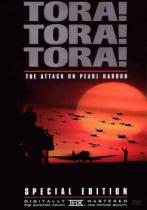Tora! Tora! Tora!
 Year:
Year: 1970
Film Studio: Twentieth Century Fox
Genre: War, Drama
Length: 145 Min.
DirectorRichard Fleischer (1916)
Kinji Fukasaku (1930)
Toshio Masuda (1927)
WritingLarry Forrester (1924)...Screenplay
Hideo Oguni (1904)...Screenplay
Ryûzô Kikushima...Screenplay
Gordon W. Prange (1910)...Based On "Tora! Tora! Tora!"
Ladislas Farago (1906)...Based On "The Broken Seal"
ProducerRichard Fleischer (1916)
Keinosuke Kubo
Otto Lang (1908)
Masayuki Takagi
Elmo Williams (1913)
CinematographerShinsaku Himeda (1916)
Masamichi Satoh
Osami Furuya
Charles F. Wheeler (1915)
MusicJerry Goldsmith (1929)...Composer
StarsMartin Balsam (1919) as Admiral Kimmel
Sô Yamamura (1910) as Admiral Yamamoto
Joseph Cotten (1905) as Henry Stimson
Tatsuya Mihashi (1923) as Commander Genda
E. G. Marshall (1914) as Lt. Colonel Bratton
James Whitmore (1921) as Admiral Halsey
Takahiro Tamura (1928) as Lt. Commander Fuchida
Eijirô Tôno (1907) as Admiral Nagumo
Review Over a quarter of a century after the infamous sneak attack by the Japanese at Pearl Harbor, studio executives in both Hollywood and Tokyo agreed to an ambitious and unprecedented film project. In a joint venture, 20th Century Fox and the Toei Company would each produce half of a film which would depict the events that unfolded that Sunday morning and told from each nation’s own perspective. Toei decided to hand their portion of the project to the finest director of the time, Akira Kurosawa. Kurosawa had become in the previous twenty years, one of the worlds most acclaimed directors and agreed to be a part of the project when he was told that the Hollywood production would be helmed by David Lean. Both directors’ shared two things in common, each had a penchant for achieving authenticity in their productions, and to that end, were willing break the budget for their respective film visions.
While Toei was willing to endure the cost overruns that were well associated with a Kurosawa film, 20th Century Fox decided that the increasing dismay surrounding the ongoing Vietnam War could hurt the film at the box office, and they decided to trim the budget for their half of the picture. They decided on Richard Fleischer as the director for their portion of the film. While Fleischer was a respected filmmaker, he was no where near the stature artistically as David Lean. Kurosawa had already started filming when word reached him of Hollywood’s decision and his demeanor on the set changed almost immediately. Feeling that he had been duped by his own studio executives, he started falling behind in his shooting schedule. When Toei learned that in response to the news of the change in directors, Kurosawa was going to turn in an almost four hour plus version of the film, they panicked. Sensing that a hemorrhaging of studio funds was about to take place, they fired Kurosawa. What had started out as a prestigious and artistic endeavor had now devolved into a glorified B-picture production.
The end result of the pre-production chaos would be a film that could best be described as Jekyll and Hyde. Even with the firing of Kurosawa, the Toei portion of the film is topnotch. The attention to factual accuracy and depiction of events never ceases to keep a firm hold of the audience’s attention, as every meticulous detail of the planning of the attack is explained. The performances of the Japanese actors is reminiscent of the caliber of acting found in Ozu’s, Mizoguchi’s and even Kurosawa’s best work. On the other hand, Fox’s contribution is riddled with problems. Clichéd dialogue, factual inaccuracies and anachronisms encompass almost every part of their production. In one scene, when the Japanese first strike wave is approaching Pearl Harbor, they pass over the white cross at Scofield Barracks. This cross was erected after the attack in memory of the people who were about to be killed by these planes. It is this lack of attention to detail that would have been avoided if Lean would have been selected to direct.
After making their decision to downgrade the directorial aspect of the film, Fox thought that planting every character actor of worth into the proceedings would lend the production an air of integrity; sadly, they were wrong. While I usually enjoy the dramatic talents of James Whitmore and Jason Robards, each seemed to be phoning in their parts for the paycheck. Never for a single moment is Whitmore believable as Bull Halsey, spouting some of the most clichéd dialogue ever uttered by a character in a war film. Robards, on the other hand, seems to have had his needle stuck on the performance he gave three years earlier as Al Capone in
The St. Valentine Days Massacre.
It saddens me to think of what this film may have been if both studios had stuck to the original blueprint, yet the end result is compelling enough in its rendition of the events that took place on that
Day of Infamy to satisfy any who are curious. If I could only rate the Japanese part of the production, then I would give it 5 stars, but as a whole, it dips down to a respectable 3 ½ star film. While it can’t be considered the prime treatise on the subject, it is leaps and bounds above Michael Bay’s overblown and bloated bit of banality,
Pearl Harbor, and you don’t have to deal with Ben Affleck.
Ratings Criterion5 Stars - The pinnacle of film perfection and excellence.
4 ½ Stars - Not quite an immortal film, yet a masterpiece in its own right.
4 Stars - Historically important film, considered a classic.
3 ½ Stars - An entertaining film that’s fun or engaging to watch.3 Stars – A good film that’s worth a Netflix venture.
2 ½ Stars - Borderline viewable.
2 Stars – A bad film that may have a moment of interest.
1 ½ Stars – Insipid, trite and sophomoric, and that's its good points.
1 Star – A film so vacuous, it will suck 2 hours from the remainder of your life.
½ Star - A gangrenous and festering pustule in the chronicles of celluloid.